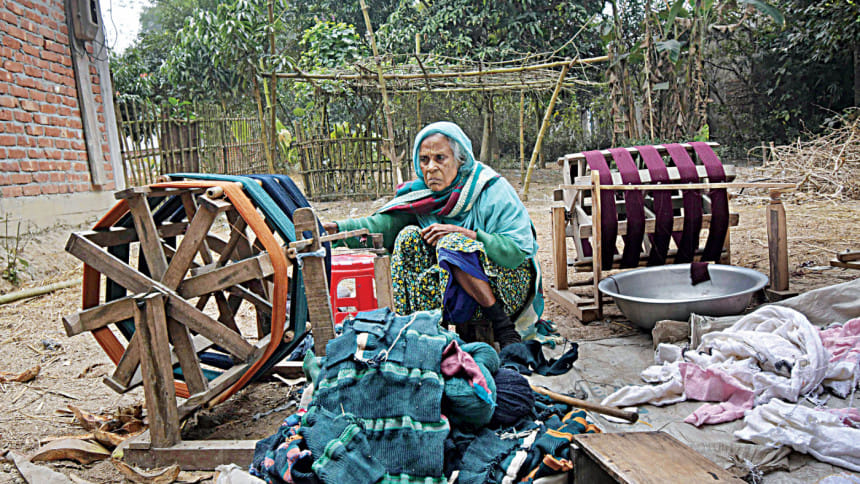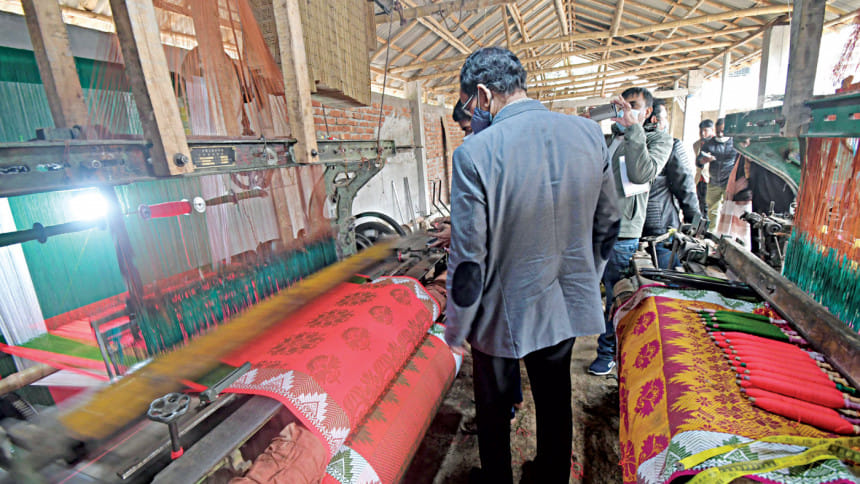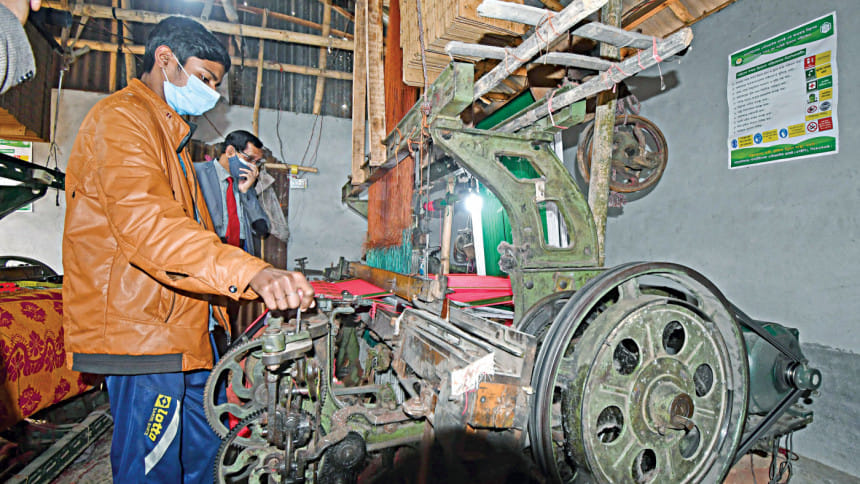Bogura weavers need easy loans, modern tech to flourish

A community of weavers in Bogura's Adamdighi upazila and its adjacent districts use garment waste to make various textile products worth Tk 200 crore annually.
However, the lack of modern equipment, skills training, banking and transport facilities in the region makes it difficult for them to add proper value to their products and, subsequently, log sufficient profits.
Around 10,000 families from Adamdighi upazila and two other nearby districts have been producing yarn and different garment items, such as mufflers, caps, blankets and bedsheets, from garment waste since the 1980s.
Yarn accounts for Tk 120 crore of the sector's Tk 200 crore annual turnover while warm clothes make up the remainder, according to local traders and weavers.
But since there is no dyeing machine in the country's northern region, the yarn is sent to Dhaka, Narayanganj, Feni or Tangail for colouring.

"We have to spend between Tk 40-55 to colour one kilogramme of yarn in Dhaka, Tangail and Feni," said Faruk Hossain, a yarn producer.
Besides, collecting garment waste from Dhaka is a difficult task.
"The traders sometimes cheat us by giving lower quality materials and also form syndicates to increase prices," Hossain added.
Similarly, the weavers who produce warm clothes have to send their products to Sirajganj for finishing since they do not have the means to do so in their own locality.
Finishing costs aside, it takes Tk 3-5 to transport each article of clothing, according to Mofazzal Hossain, president of the Nosratpur Weavers' Samabay Samity, a cooperative of weavers.
Most of the finished products are sold at Shaul Haat, a temporary market that sits twice a week, where 8 to 10 trucks visit to collect the goods through a very dilapidated 3.5-kilometre entry road from the Bogura-Naogaon highway.
Jakir Hossain, a trader at Shaul Haat, said since the road is single lane, transportation of the goods is very time consuming.
Besides, on rainy days it becomes a serious risk to carry products through the road, he added.
When contacted, Sajedur Rahman, an official of the Local Government Engineering Department in Adamdighi, said they have been performing repairs on the road for the past month and are working to make it a little wider by expanding three feet on both sides.
Meanwhile, securing bank loans remains a big challenge for small entrepreneurs of these rural areas.
Since they are unable to avail loans from banks with easy terms and conditions, the small entrepreneurs turn to local NGOs that provide funding at high interest rates.
The SME Foundation previously chose the area as a potential industrial cluster and started providing loans and skills training in 2014.
The foundation has conducted some 13 training courses for 107 of Shaul Bazar's traders on accounting, business management, design, dyeing, export-import policy, marketing and leadership.

However, this training and loan service does not cover the thousands of traders and small entrepreneurs in the region.
"We have so far given loans amounting to Tk 5.61 crore among the entrepreneurs of the Shaul handloom cluster from our own fund," said Dr Md Mofizur Rahman, managing director of the SME Foundation.
This year, the government provided the SME Foundation with Tk 300 crore for distribution among its 177 selected clusters throughout the country with Shaul handloom being a potential cluster.
"So hopefully, we can provide more loans and training to them soon," Rahman said.
However, local entrepreneurs said getting a loan from the foundation is not an easy task since they have to fulfil difficult criteria while the interest rate is set at 9 per cent, which is equal to formal banks.
Rafiqul Hossain, a local trader who borrowed Tk 15 lakh from the foundation through Bank Asia, said that the organisation should provide low interest loans at 4 to 5 per cent with easy terms and conditions.
Asked about the matter, the foundation's managing director said due to a shortage of manpower, they are providing loans through banks.
"We already discussed with all bank authorities to decrease the interest rate and make it easier to get loans," he added.
However, many entrepreneurs have alleged that they do not get the SME loan since they are small traders.
Md Rashedul Karim Munna, a director of the SME Foundation and managing director of Creation Private, told The Daily Star that the garments industry produces garment waste worth nearly $1 billion annually.
Most of this waste comes directly to the Shaul Haat area in Bogura.
In the global arena, natural and recycled products already hold 4-6 per cent of the market share and its demand is growing day by day.
As the weavers of Shaul Haat area make clothes from garment waste and rejected yarn, they can also make them exportable if they know how to add value to their products.
"So if we can provide loans, training on design, equipment and business policy, then such a rural-based industry will be a future model of the country's economy," Munna said.

 For all latest news, follow The Daily Star's Google News channel.
For all latest news, follow The Daily Star's Google News channel. 



Comments